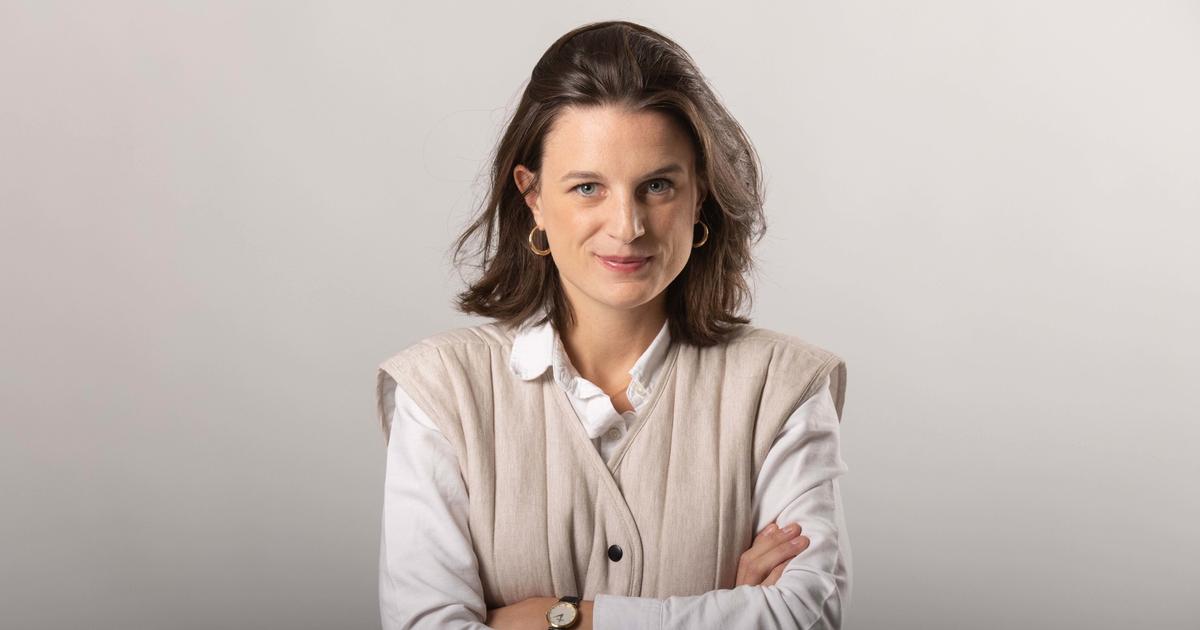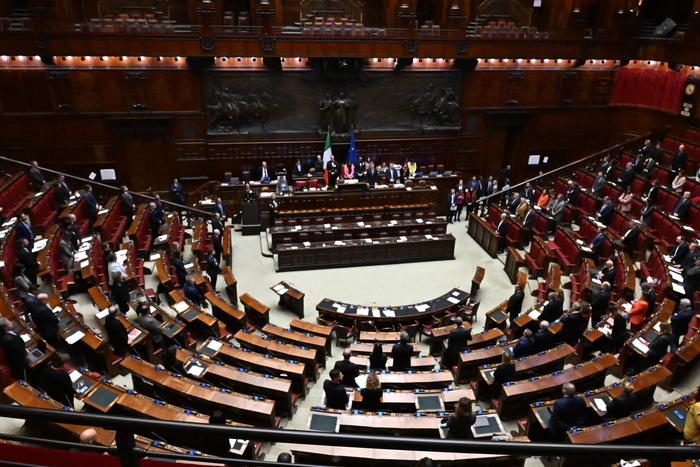Demonstrators of the Women's Political Council Land Brandenburg eV in Potsdam
Photo: Soeren Stache / dpaOn the day the Brandenburg State Constitutional Court is supposed to negotiate the first parity law in Germany, it is 32 degrees outside. The air conditioning in the hall is switched off due to corona regulations. And because those present have to wear masks when entering the room, the women protesting in front of the court simply printed their demands on the white piece of cloth on their faces. It says "Pari, Pari". Half half.
The question at stake in the proceedings is whether the electoral amendment law that the Brandenburg state government passed last year is constitutional. Then, for the next state election in 2024, the parties would be obliged to fill their electoral lists with equal numbers of men and women.
The parties NPD and AfD have sued against it. They see the law as impairing the freedom of choice and the freedom of parties to organize. Four members of the AfD have also filed constitutional complaints. The Thuringian Constitutional Court recently declared a similar law null and void. The reasoning stated that, through a parity law, voters could no longer freely decide whether they wanted to send more women or more men to parliament. But three of the nine judges voted against the decision in separate votes. Supporters of the parity law hope, among other things, for a different verdict in Brandenburg. Because not only the constitutions of the two countries - the election amendment laws are also different in terms of content.
While the women are packing up their posters in front of the court, the plaintiffs and defense lawyers are already seated between dividing panes in the courtroom. On the plaintiff's side, there are noticeably many bald men who will usually laugh during the trial when the court advises them to seek more women in their parties. On the other side, the President of the State Parliament, Ulrike Liedtke, is sitting with Jelena von Achenbach, authorized representative. Some of the protesters from outside have gathered behind them, most of them laughing when the AfD and NPD lawyers argue that they cannot find women because women also have children.
The NPD and AfD see no discrimination against women
During the trial, the AfD and NPD lawyers argue that the parity law "lays the ax to central electoral principles", as NPD lawyer Peter Richter explains. That there is no structural disadvantage for women and that it is simply about "selecting the best". The two lawyers stretch out their words, they speak loudly, lean back in their chair. In between, the legal representative of the AfD, Karl Albrecht Schachtschneider, quotes Jean-Jacques Rousseau's theory of democracy. Later he calls out: "Human dignity is inviolable!" A dignity that ignores the law of parity.
Achenbach usually reacts coolly to the plaintiffs' provocations, repeatedly emphasizing that a parity law is not constitutionally required, as her colleague in Thuringia had argued. But the constitution allows such a law, it has not been explicitly excluded. The legislature has the task of interpreting voting principles. The right to vote is changeable. The parity law serves the actual equality, as it is laid down in the Brandenburg constitution in paragraph 12, paragraph 3. Unlike the Thuringian state constitution, which requires "suitable measures" to enforce equality, the Brandenburg constitution demands "effective measures" from the state. Parity lists, says Achenbach, reduce the de facto privileges of men.
The parties, she argues further, are mediators between the people and politics: It is therefore not about how many women a party has when filling equal lists, as the NPD lawyer argues. It's about the fact that 50 percent of the population are women.
How the Brandenburg court will judge in the end is difficult to predict. Unlike in Thuringia, there are four women among the nine judges at the Brandenburg Constitutional Court. It is also considered more liberal.
The presiding judge Markus Möller rejected some parts of the constitutional complaint of the AfD members at the beginning of the hearing for formal reasons. He then asked if a paragraph of the Electoral Amendment Act did not indicate that the interference of the amendment was much less than the plaintiffs' interpretation suspected. Möller wants to know: Is an electoral list permissible even if it does not have equal representation?
Achenbach explains: If a list is not quoted, the electoral committee has to reject it - unlike in Thuringia. There the list should have been cut off at the point where the parity ends. The NPD is foaming. A list of ten men would therefore be rejected. These ten men would be excluded from the election, NPD lawyer Richter countered.
Shortly before 6 p.m. on Thursday - almost half of those present have already left the room - the judges want to know exactly again.
"What do you say to the applicant from 3rd place on the list? That he is not allowed to place 2nd on the list because he is of a different gender?" They ask. "What do you say to the second place, if the candidate in place 1 dies and the candidate moves up from place 3 to place 1, past him?"
"I don't want to argue again about whether there are factual disadvantages for women"
Jelena von Achenbach
Achenbach is clearly tired. It's hot in the room. She repeats what she has already said several times in the past eight hours: There is no right to a place on the list. There is a democratic decision by the party whether men or women are the top candidates. Finally, she says: "I don't want to discuss again whether there are factual disadvantages for women."
After the negotiation, the representatives of the NPD and AfD congratulate each other in front of the hall. In front of the building, a few women with "Pari, Pari" masks call Achenbach a heroine. The Brandenburg court wants to announce its decision on October 23. If it follows the decision in Thuringia, there would no longer be a parity law in Germany.
Icon: The mirror





/cloudfront-eu-central-1.images.arcpublishing.com/prisa/NYBERFPPHVEJVER4FIRIEAGGX4.jpg)

/cloudfront-eu-central-1.images.arcpublishing.com/prisa/EMYXC3EVHNEG3OJHGIQCB2IVYA.jpg)






